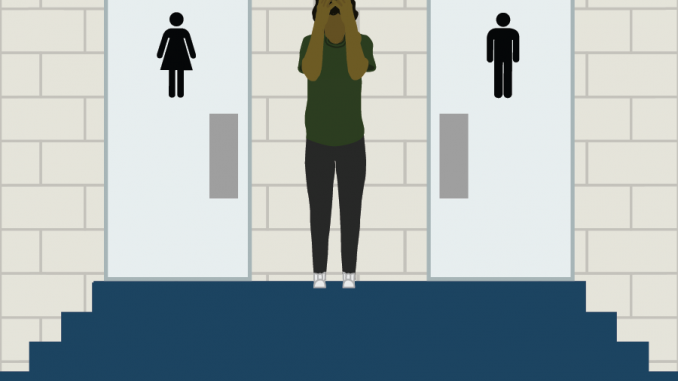
Despite a university-wide closure due to COVID-19, social work students Renee Mackintosh and Bean Blumenstock are still fighting to improve conditions on Main Campus.
Their Change.org petition calling for accessible, gender-neutral bathrooms in new buildings has gained 253 signatures as of publication. They hope the petition will educate others about how lack of restrooms impacts the approximately 721 transgender and gender non-conforming students and students with disabilities on Main Campus.
Mackintosh and Blumenstock were inspired to start the petition after learning about the final social work research project done by Loran Grishow-Schade, a 2019 social work graduate, they said.
For the project, Grishow-Schade took a personal issue they experienced and made it the project’s focus.
“The very first day that I was at the university I was trying to find a bathroom, before class started, and I couldn’t find a gender neutral bathroom anywhere,” Grishow-Schade said.
Their study, Bathroom Access Disparities at Temple University, included going to all of Main Campus’ buildings and checking if bathrooms were gender inclusive and accessible. Grishow-Schade decided to include accessible bathrooms in the survey as well because they recognized that transgender and non-binary students share similar difficulties.
“If we’re going to have more inclusive buildings and we’re gonna have a more inclusive environment because we know the unique needs of folks with disabilities and folks who are transgender and non-binary,” they said.
For reference, Grishow-Schade started with the Gender Inclusive Restrooms directory on Temple’s Institutional Diversity webpage. What they saw was not encouraging.
“I was kind of taken aback that the very first resource that non-binary and trans folks see is to go into an unmarked basement bathroom that is in the janitor’s closet,” they said.
The study concluded that as of February 2019, of the 1,602 toilets on main campus, 52 percent were designated for men, 46 percent for women, 5 percent for individuals with disabilities and 2 percent were gender inclusive.
A key concern about the disparities were the health risks. Transgender people, gender non-conforming people, and individuals with physical disabilities run a higher risk of urinary tract infections, dehydration, kidney infections, and other kidney-related issues because they lack access to a restroom throughout their day, according to the report.
For Blumenstock, these difficulties reminded them that everyday activities can be a privilege.
“If you’re in a wheelchair and also a gender non-conforming person, you’re so screwed,” they said. “You have to have someone to open the door for you or go all across campus and it’s a lot of work.”
For Mackintosh, the research reminded her that being “accessible” and “inclusive” means more than putting a designation on the door. To her, it means having the ability to use the restroom without assistance and with ease, she said.
“[A restroom] needs to have a sensor so students can wave their hands to enter, that’s what being accessible really means,” she added. “And having all-gender restrooms doesn’t mean anything if students can’t find them.”
Although Temple’s classes and operations have moved online for the remainder of the semester, Mackintosh and Blumenstock will continue to advocate for changes to be made when the main campus reopens.
Blumenstock feels that during social distancing, people can take time to research issues like these. They hope to connect with alumni and other social justice and advocacy groups to spread the word about the petition.
Mackintosh sees the transition to online as a particular advantage because the petition itself is accessible online. She and Blumenstock hope to bring the petition to President Englert after they reach 1,000 signatures.
Grishow-Schade said they made Temple administration aware of the issue last year. They sent a copy of their report to members of administration and staff, and dropped off a copy at each person’s office, according to their documents. To date, they only ever heard back from one faculty member, they said.
Grishow-Schade hopes Mackintosh and Blumenstock will be successful in ending the “passing of the baton” on this issue, they said.
Blumenstock acknowledged that while they may have to give this project to other social work students after they graduate, they still feel it’s important for people to know what life is like for their peers.
“I think a huge purpose of the petition is just to make people feel and imagine and think about what it’s like to be people who don’t have the privileges of slipping into like society’s boxes that are set up, and people consider how it affects their day to day,” they said.



Please sign the gender-neutral wheelchair accessible bathroom petition here: https://www.change.org/templeaccessiblebathrooms